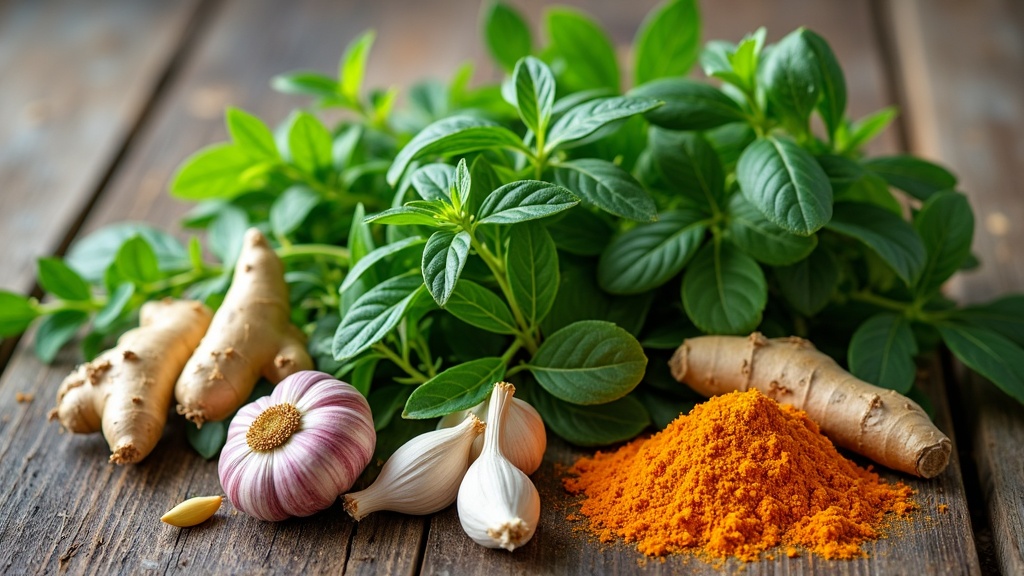Staying healthy is important to me, and one simple way I like to support my immune system naturally is by using herbs. Certain herbs aren’t just flavorful; they’re also packed with plant compounds that can help your body stay in balance and ready to fight off bugs. If you’re new to using herbs or struggling to figure out where to start, the list I’ve put together will walk you through some of the best herbs that make it easy to support your immune system the natural way.

Why Go Natural for Immunity Support?
Herbs have been used for centuries in many cultures, and there’s a pretty good reason for that. They’re easy to add to your meals, make soothing teas, or sometimes chew fresh if you’re adventurous. Most importantly, lots of herbs are loaded with antioxidants, vitamins, and minerals. While medical treatment is still super important when you’re sick, using herbs as part of your daily routine can sometimes give your immune system a boost to keep it running strong.
A healthy immune system is like your body’s security guard, stopping unwanted intruders such as viruses or bacteria in their tracks. Herbs won’t make you invincible, but there is evidence and a lot of real-world experience suggesting they can help your body respond to everyday threats a little more quickly and effectively.
Understanding How Herbs Can Help Immunity
The cool thing about herbs is that many help in more ways than one. Some support your immune system directly, while others give a boost by reducing stress, supporting gut health, or delivering key nutrients. Here’s a quick breakdown on why certain herbs are known to be great for immune support:
- Antioxidant content: Fights off cell damage and gives defense against everyday stressors.
- Anti-inflammatory benefits: Lowers chronic inflammation, making it less likely your immune system gets overworked.
- Antimicrobial properties: Helps ward off unwanted bacteria and viruses before they become a bigger problem.
Including a mix of these herbs in your diet gives your immune system some extra help by delivering natural backup when you need it most, without relying on heavy medications unless necessary.
Top 10 Herbs To Strengthen Your Immune System Naturally
- Echinacea
Echinacea is a well-known herb for immune health. It’s often found in teas and tinctures at health food shops. There’s research showing Echinacea may help shorten the length of a cold, and many people use it right at the start of feeling under the weather. I like it as a hot tea when I feel a scratchy throat; it has a mild, earthy taste and feels soothing on tough days. - Elderberry
Elderberry is popular for good reason. These tiny berries pack a big punch in fighting off viruses. I use elderberry syrup through the winter months, and it’s pretty tasty. Studies suggest elderberries might reduce cold and flu length and even help with some symptoms, making them a handy addition to your routine if you want some natural support. - Garlic
Garlic isn’t just for cooking. Fresh garlic contains allicin, a compound that might support immunity and has some antiviral properties. When I’m meal prepping, I try to add raw or lightly cooked garlic into soups and stir fries for more flavor and hopefully, fewer sick days. Plus, the savory taste always gives meals an extra pop. - Ginger
Ginger root is a longtime favorite for both stomach problems and immune support. I’ll grate some fresh ginger into hot water with lemon and honey. There’s evidence that ginger can help with inflammation, which helps your immune system work at its best. The spicy warmth of ginger tea is perfect for chilly evenings, and it helps keep sniffles away. - Turmeric
Turmeric’s big claim to fame is curcumin; that’s what gives it the bright yellow color. Curcumin is known for reducing inflammation and acting as an antioxidant. I sprinkle turmeric into curries and smoothies, but golden milk (turmeric tea with milk and spices) is always nice for a calming evening drink. Its earthy flavor adds plenty of depth to dishes, and it’s good for you too. - Astragalus
Astragalus is a classic herb from traditional Chinese medicine often used as a daily tonic for immune support and energy. The root is usually simmered in soups or made into teas. I find its mild, earthy flavor blends easily with almost any broth. A warm bowl of astragalus soup is just right for cooler weather or when you feel you need a little extra support. - Andrographis
Andrographis isn’t as well known, but I think it’s worth checking out. There’s a bit of clinical research showing it may help with upper respiratory infections like colds. Most people take it in supplement form, especially when the cold season kicks in. If you’re feeling rundown, this herb is worth having on hand as part of your toolkit. - Sage
Sage is more than a holiday seasoning. It has natural antimicrobial effects and is a classic for supporting sore throats and coughs. I like brewing a sage tea, letting it cool, then gargling with it when I feel my throat getting scratchy. Sage adds a herby punch to stuffings and roasted veggies, making it easy to include in meals as well. - Licorice Root
Licorice root soothes and supports the immune system, but use it carefully. Too much can affect blood pressure, so moderation is key. I add it to homemade herbal teas because it’s sweet and calming on the throat, especially on days when your throat feels raw or tired. - Rosemary
Rosemary is packed with powerful antioxidants that protect cells and help support your natural defenses. I’ll chop it fine for roasted veggies or infuse it into olive oil for dipping bread. The woodsy flavor is great, and the extra immune bonus is always nice. Rosemary can be added to marinades, sauces, or even made into tea for a flavorful twist.
How to Use Immune-Boosting Herbs
Getting herbs into your day isn’t hard or expensive. Here are some tips I use myself to keep things easy and tasty:
- Add fresh herbs to salads, soups, and sandwiches for extra flavor and nutrients. They’re easy to toss into pasta or blend into homemade dressings, too.
- Make herbal teas with fresh or dried ginger, sage, or licorice root. Steep them for at least 10 minutes for a stronger brew, and add lemon or honey for extra benefits.
- Blend turmeric or ginger into smoothies, or mix them with honey and a little water to make quick tonics that can be taken as a morning shot.
- Use concentrated tinctures when you want a quick shot of herbal support (always follow directions on the bottle). Tinctures are perfect for busy people who want a boost on the go.
If you’re new to herbs or trying one for the first time, try a small amount and watch for any reactions. Quality matters, so I stick to buying from reputable brands or, even better, using herbs I grow myself or get from local markets and farmers.
Things You Might Want to Know Before Trying Herbal Immunity Boosters
While these herbs are natural and generally safe for most people, it helps to know a few things before jumping in. Here are some smart tips to keep in mind:
- Possible Allergies: Test any new herb in a small amount first; you never know how your body will react. Allergies to herbs are uncommon but possible, especially with plants you haven’t tried before.
- Medication Interactions: Some herbs can interact with common medicines. Licorice, for example, isn’t a good idea for anyone with high blood pressure due to its effect on sodium balance. If you’re on meds, check with a healthcare provider before starting anything new, just to be safe.
- Preparation and Freshness: Fresh and dried herbs are usually more effective than heavily processed ones. Check the source, storage, and expiry dates for anything you buy premade to make sure you’re getting the best quality.
- Safe for Kids and Pregnant Women: Not every herb is right for all ages or during pregnancy. Astragalus, for instance, isn’t usually recommended for young kids or pregnant people unless you’ve gotten advice from a professional. Do your research or ask your doctor when in doubt.
Why Dosing Matters
It’s tempting to believe that more is always better, but with herbs, balance is important. Sticking with sensible, food based servings is safest. When using teas, stick with a cup or two a day unless a herbalist or doctor gives you the green light to use more. With supplements or tinctures, always follow the label instructions or the guidance from a qualified professional.
Building Healthy Habits Alongside Herbs
Herbs can help, but they work best when you’re also sleeping enough, eating a balanced diet, and staying active. I try to combine these herbs with good hydration, stress management, and wholesome meals because it all works together, keeping the immune system balanced for the long haul. Don’t forget small things, like washing your hands and spending time outdoors, which also keep your immune system in top shape.
Frequently Asked Questions
Here are a few questions people sometimes ask about using herbs for immune support:
Question: Can I use several of these herbs together?
Answer: Yes, you can. Many herbal teas and blends mix ingredients like ginger, licorice, and turmeric for added effects and flavor. Just start slow and only combine ones you know agree with you. Mixing herbs can boost their benefits, but always pay attention to how your body feels.
Question: How quickly do immune-boosting herbs work?
Answer: Some people notice benefits within a day or two, especially for soothing symptoms. For building long-term resilience, it can take a few weeks of consistent use to really notice a difference. Stay patient; even mild herbs need time to work with your body.
Question: Can herbs actually replace medication if I’m sick?
Answer: Herbs are a great addition to a healthy routine, but should not replace medical treatment for infections or more serious illnesses. Use them as support, not a substitute, and check with your healthcare provider if you’re unsure about mixing herbs with medications or health conditions. It’s always better to ask up front.
Making the Most of These Herbs
Adding the right herbs to your routine gives your immune system a natural hand in handling whatever comes its way. Whether blended in a tea, added fresh to your foods, or used as supplements, these herbs are tasty and simple ways to feel your best all year long. If you’re just getting started, experiment with one or two herbs and see what your body likes best. There are plenty of options out there, and even a little goes a long way in keeping your immune system happy and ready to tackle the challenges of every season. Remember, it’s the small daily habits that really keep you feeling your best.
